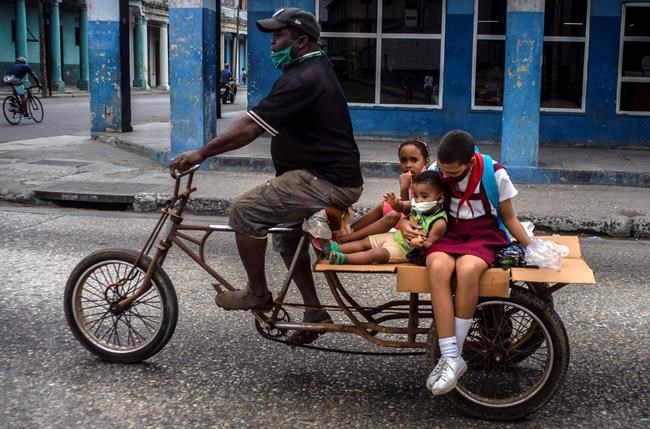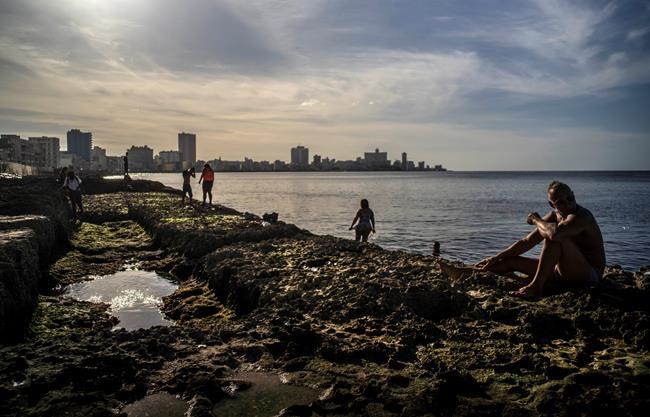Trump hits Cuba with new terrorism sanctions in waning days
Advertisement
Read this article for free:
or
Already have an account? Log in here »
To continue reading, please subscribe:
Monthly Digital Subscription
$0 for the first 4 weeks*
- Enjoy unlimited reading on winnipegfreepress.com
- Read the E-Edition, our digital replica newspaper
- Access News Break, our award-winning app
- Play interactive puzzles
*No charge for 4 weeks then price increases to the regular rate of $19.00 plus GST every four weeks. Offer available to new and qualified returning subscribers only. Cancel any time.
Monthly Digital Subscription
$4.75/week*
- Enjoy unlimited reading on winnipegfreepress.com
- Read the E-Edition, our digital replica newspaper
- Access News Break, our award-winning app
- Play interactive puzzles
*Billed as $19 plus GST every four weeks. Cancel any time.
To continue reading, please subscribe:
Add Free Press access to your Brandon Sun subscription for only an additional
$1 for the first 4 weeks*
*Your next subscription payment will increase by $1.00 and you will be charged $16.99 plus GST for four weeks. After four weeks, your payment will increase to $23.99 plus GST every four weeks.
Read unlimited articles for free today:
or
Already have an account? Log in here »
Hey there, time traveller!
This article was published 11/01/2021 (1797 days ago), so information in it may no longer be current.
WASHINGTON – The Trump administration on Monday re-designated Cuba as a “state sponsor of terrorism,” hitting the country with new sanctions that could hamstring President-elect Joe Biden’s promise to renew relations with the communist-governed island.
Secretary of State Mike Pompeo announced the step, citing in particular Cuba’s continued harbouring of U.S. fugitives, its refusal to extradite a coterie of Colombian guerrilla commanders as well as its support for Venezuelan leader Nicolás Maduro.
The designation, which had been discussed for years, is one of several last-minute foreign policy moves that the Trump administration is making before Biden takes office Jan. 20.

Removing Cuba from the blacklist had been one of former President Barack Obama’s main foreign policy achievements as he sought better relations with the island, an effort endorsed by Biden as his vice-president. Ties had been essentially frozen after Fidel Castro took power in 1959.
As he has with Iran, Trump has sought to reverse many of Obama’s decisions involving Cuba. He has taken a tough line on Havana and rolled back many of the sanctions that the Obama administration had eased or lifted after the restoration of full diplomatic relations in 2015.
Since Trump took office, after a campaign that attacked Obama’s moves to normalize relations with Cuba, ties have been increasingly strained.
In addition to attacking Cuba for its support of Maduro, the Trump administration has also suggested that Cuba may have been behind or allowed alleged sonic attacks that left dozens of U.S. diplomats in Havana with brain injuries starting in late 2016.
However, few U.S, allies believe Cuba remains a sponsor of international terrorism, quibbling with either the definition based on the support for Maduro or outright rejecting American claims that Cuban authorities are bankrolling or masterminding international terrorist attacks.
Rep. Gregory Meeks, the new chairman of the House Foreign Affairs Committee, said Trump’s designation would not help the Cuban people and seeks only to tie the hands of the Biden administration.
“This designation of Cuba as a state sponsor of terrorism with less than a week to go in his presidency and after he incited a domestic terror attack on the U.S. Capital … that’s hypocrisy,” Meeks said in an interview with The Associated Press.
Nonetheless, cheered on by Cuban American and Venezuelan exiles in south Florida, the Trump administration has steadily increased restrictions on flights, trade and financial transactions between the U.S. and the island.
The latest sanctions put Cuba alongside North Korea, Syria and Iran as the only foreign nations deemed state sponsors of terrorism. As a result of Monday’s actions, most travel from the U.S. to Cuba will be barred as well as the sending of remittances to Cuba from relatives in the United States, a significant source of income for the impoverished island.
But with dollar-generating business already reeling from the effects of the coronavirus and previous measures like Trump’s ban on cruise ships and cap on remittances, the biggest impact will likely be diplomatic.
“This will really slow any thaw in relations with the Biden administration,” said Emilio Morales, an exiled Cuban economist and president of the Miami-based Havana Consulting Group.
Morales said unwinding the measure will take at least a year and require careful study by the U.S. government. He is also doubtful whether Biden, who played no significant role in the Obama administration’s opening to Cuba, would be willing to invest the sort of political capital Obama did and throw a lifeline to Cuba’s leadership without anything in return.
Obama’s removal of Cuba from the “state sponsors of terrorism” list had been a major target of Trump, Pompeo and other Cuba hawks in the current administration.

Cuba has repeatedly refused to turn over U.S. fugitives that have been granted asylum, including a black militant convicted of killing a New Jersey state trooper in the 1970s. In addition to political refugee status, U.S. fugitives have received free housing, health care and other benefits thanks to Cuba’s government, which insists the U.S. has no “legal or moral basis” to demand their return.
But perhaps the biggest change since Obama’s outreach in 2015 is Cuba’s strong support for Maduro, who is considered by the a dictator whose pilfering of the oil-based economy has driven 5 million Venezuelans from their homes.
Cuba has had a long-standing alliance with Maduro, although it has long denied it has 20,000 troops and intelligence agents in Venezuela and says it has not carried out any security operations. Cuban officials, however, have said they have the right to carry out broad military and intelligence co-operation that they deem as legitimate.
The relationship between the two countries has grown strong in the past two decades, with Venezuela sending Cuba oil shipments worth billions of dollars and receiving tens of thousands of employees, including medical workers.
In May 2020, the State Department added Cuba to a list of countries that do not co-operate with U.S. counter-terrorism programs.
In making that determination, the department said several leaders of the National Liberation Army, a Colombian rebel group designated a terrorist organization, remained on the island despite Colombia’s repeated request they be extradited to answer for the 2019 car bombing of a police academy in Bogota that killed 22 people.
Cuba has rejected such requests, saying that turning over the leaders would violate protocols agreed to by Colombia’s government for peace efforts that were broken off after the deadly bombing.
In repudiating the allegations, President Miguel Díaz-Canel has said Cuba was the victim of terrorism. He cited an armed attack on its embassy in Washington last April as one example. Cubans see the blacklist as helping the U.S. justify the long-standing embargo on the island and other economic sanctions that have crippled its economy.
___
Associated Press diplomatic writer Matthew Lee reported this story in Washington and AP writer Joshua Goodman reported from Miami.







